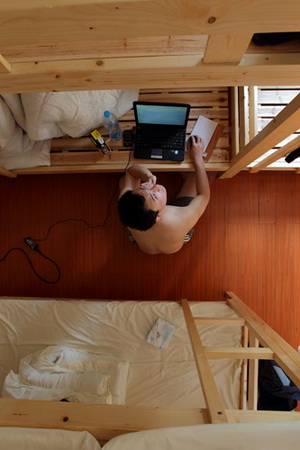Economy
Hostels provide refuge for city job seekers
Updated: 2011-07-05 13:13
By Yu Ran (China Daily)
|
 Wei is staying in a small job hostel on North Zhongshan Road in Shanghai. He arrived a week ago from Shenzhen, Guangdong province.[Photo /China Daily] |
|
|
Sharing a double bed with a roommate in a 20-square-meter bedroom, Ma Chao is quite satisfied with his living conditions.
A year ago Ma lived with another person in a 7-sq-m room, sharing a bathroom with more than 20 people. He had difficulty finding work and earning money, so he slept in a job hostel.
|
||||
Ma was born in Yancheng, Jiangsu province, and graduated from Wuhan Textile University, majoring in English. He came to Shanghai last year, looking for a job.
He and other migrants like him found the job hunt trying, and they needed financial support from their parents from time to time. "One evening we only had 10 yuan left altogether and we had to buy and share a few steamed buns for our dinner."
Where to live at the lowest cost is the first and biggest problem for newly arrived, unemployed migrants. Youth hostels specially designed for young job seekers fill the bill for many.
Most rental properties require tenants to pay at least one month's rent as a deposit, sign a one-year lease and give a month's notice before moving out. Job hostels allow residents to check in or out without notice, and fees are charged at a daily rate.
"We aim to provide convenience and assistance to enable new graduates who come to Shanghai for jobs to check in and out anytime they want, as a combination of hostel and rental apartment," said Tong Xianjin, owner of Bai Yuan Job Hostel. He opened the first of his five hostels in Shanghai four years ago.
"The occupancy rate of our rooms averages 80 to 90 percent," Tong said, "with more students coming between June and August, the peak of graduation season, and staying up to half a year before moving out to live nearer to where they work."
Diploma check
The job hostel concept was introduced to China in 2006, when the booming real estate market pushed prices out of most job seekers' range.
"Different types of rooms are available, from single room, double room to quadruple room, a room for six people and eight people, with prices from 10 yuan to 80 yuan a day, " Tong said.
As at traditional hostels, shared bathrooms and kitchen are available for up to 20 residents. At these hostels, tenants have to show their college diplomas before checking in.
In its latest report, in February, the State Department of Human Resources and Social Security forecast that more than 6.5 million college graduates would rush to job fairs in June and August along with senior high or junior school graduates who quit school, laid-off urban workers and retired soldiers. They would total 24 million job seekers - competing for 12 million jobs.

Specials

90th anniversary of the CPC
The Party has been leading the country and people to prosperity.

My China story
Foreign readers are invited to share your China stories.

Green makeover
Cleanup of Xi'an wasteland pays off for ancient city




